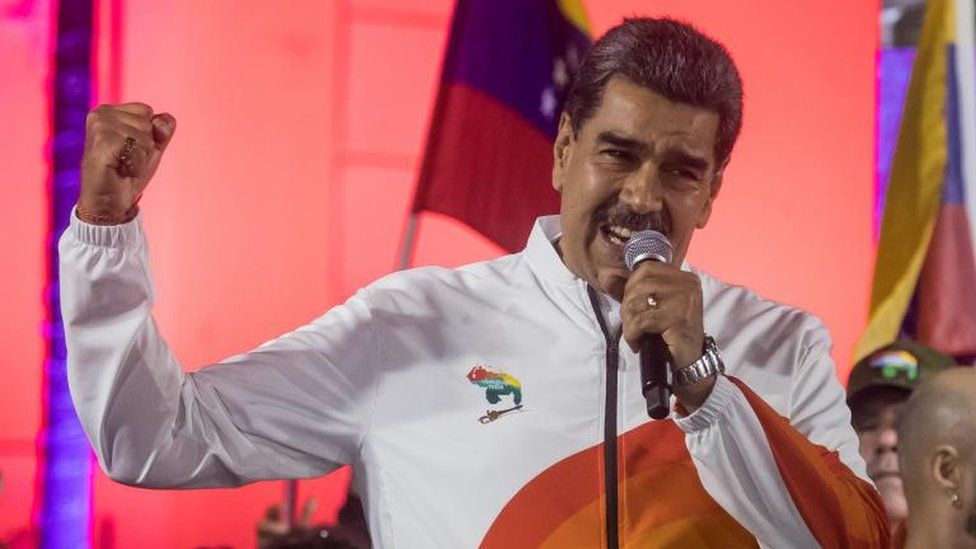Essequibo: Venezuelans back claim to Guyana-controlled oil region
Image source, EPA
Image caption,The Venezuelan president described the result as a great victory but critics have queried the turn-out

By Vanessa Buschschlüter
BBC News
Venezuelans who turned out to vote in a referendum on the status of a disputed oil-rich territory long controlled by Guyana have overwhelmingly backed Venezuela's territorial claim.
More than 95% approved establishing a new Venezuelan state in the territory known as Essequibo, officials said.
Guyana, and British Guiana before it, have administered Essequibo for over a century.
The referendum has ratcheted up tensions between the two neighbours.
Critics of the Venezuelan president, Nicolás Maduro, say he called the non-binding referendum to whip up nationalist fervour and distract from calls for free and fair elections to be held.
President Maduro, who has been in power since 2013, had urged people to turn out en masse and vote "five times 'yes'" to the five questions his government had posed on the status of Essequibo.
The 159,500-sq-km (61,600-square-mile) region makes up two thirds of the total of the land currently controlled by Guyana.
Venezuela has long maintained that a decision taken in 1899 by an international arbitral tribunal to award it to Britain, the colonial power which at the time ruled over Guyana, was unfair.
The matter is currently before the International Court of Justice, although Venezuela has disputed the international court's authority to rule on the Essequibo dispute.
In the referendum, the Venezuelan government asked voters to back its stance on the dispute.
The most controversial question was the fifth, which asked Venezuelans if they agreed with "the creation of the Guayana Esequiba state" and its "incorporation into the map of Venezuelan territory".
Electoral officials said 95.9% of voters cast a "yes" vote to that question.
Guyana has denounced the proposal as an attempt at annexation and President Irfaan Ali has accused his Venezuelan counterpart of fomenting conflict by calling for the referendum.
President Maduro hailed the results as "an overwhelming victory". "We have taken the first steps of a new historic stage in the struggle for what belongs to us, to recover what the liberators left us," he said.
The overwhelming support shown by voters had been widely expected as Venezuela's claim of sovereignty over Essequibo has very broad support in the country.
Image source, Getty Images
Image caption,Posters and graffiti in Caracas try to drive home the message that Essequibo is Venezuelan
This is reflected in the fact that there was no campaign for a "no" vote.
What analysts were keen to see was how many people would follow the government's call to turn out.
Elvis Amoroso, the head of the National Electoral Council and a close ally of President Maduro, said that 10.5m votes had been cast - something he described as "historic" in the country of 20.7m eligible voters
What Mr Amoroso did not say was how many voters took part in the referendum, a detail opposition politicians seized on.
Henrique Capriles, who lost to Mr Maduro in the 2013 presidential election, suggested that considering that voters were asked to respond to five questions, the 10.5m votes only equated to two million voters.
Opposition media also reported that polling stations had been very quiet throughout the day, casting doubt on the claims of the government that turn-out had been high.
The referendum came at a time of heightened tension between Guyana and Venezuela after the 2015 discovery of oil in the waters off Essequibo's coast by US oil giant ExxonMobil.
Tensions increased further in September this year, when Guyana held an auction at which oil companies bid for exploration licences in Essequibo waters.
Guyanese citizens formed human chains on Sunday to show their support for Essequibo remaining under the control of their government.
Guyana's president reassured them in an address broadcast on Facebook, saying that "there is nothing to fear" and that his government would defend the country's borders.
The International Court of Justice has warned Venezuela not to take any action that may alter the status quo in Essequibo.
Related Topics

























































